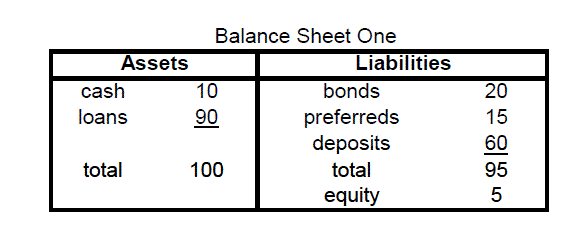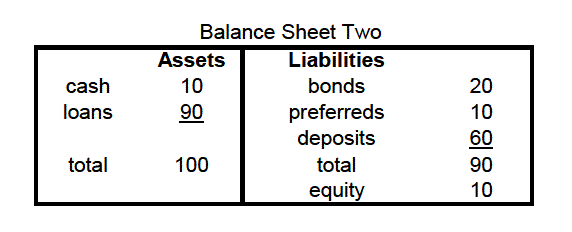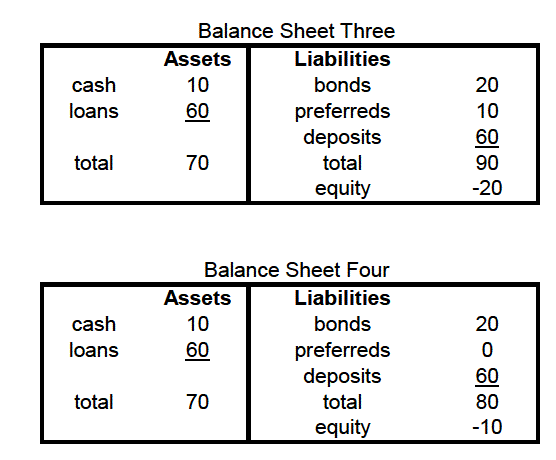U.S. Treasury Smoke and Mirrors Turning Bankrupt Banks Solvent
Politics / Credit Crisis Bailouts Apr 28, 2009 - 12:47 AM GMTBy: Paul_L_Kasriel
 Preferred Equity into Common Equity – Accounting Alchemy? - Congress currently is in no mood to authorize more funds to help recapitalize the financial system. The Treasury says this will not be a problem. If financial institutions need additional capital from the taxpayers to remain solvent, the Treasury will simply shift the preferred shares it already owns in financial institutions to common equity shares. Voila - capital adequate financial institutions! Really?
Preferred Equity into Common Equity – Accounting Alchemy? - Congress currently is in no mood to authorize more funds to help recapitalize the financial system. The Treasury says this will not be a problem. If financial institutions need additional capital from the taxpayers to remain solvent, the Treasury will simply shift the preferred shares it already owns in financial institutions to common equity shares. Voila - capital adequate financial institutions! Really?
Consider Balance Sheet One of hypothetical Gotham City Bank. Assets equal liabilities plus common equity. That is good for starters.

But suppose the Treasury believes that Gotham should have a ratio of common equity to total assets of 10% rather than the 5% it currently has. No problem. Treasury will just convert $5 of the preferred shares it owns in Gotham to $5 of common equity. This is shown in Balance Sheet Two. Now Gotham is well capitalized, right? Wrong. The depositors and the bond holders always were in line in front of the preferred shareholders in case Gotham had to be liquidated. So, moving $5 from the preferred equity category to the common equity category does not make the depositors and bond holders any better off. Are taxpayers any worse off? Not really. If Gotham's original $5 of common equity was not going to be enough of a cushion to protect depositors and bondholders, then taxpayers were not going to get all of their preferred-share holdings back anyway.

Now suppose that $30 of Gotham's loans and investments become uncollectible, as shown in Balance Sheet Three. This means that all of Gotham's common equity has been wiped out. In fact, Gotham now has an equity "deficiency" of $20. No problem, according to Treasury. It will simply convert its remaining $10 of preferred equity to common equity. That won't cut it in this case. As shown in Balance Sheet Four, Gotham still has a common equity deficiency of $10. In other words, if Gotham were to be liquidated, there are only $70 of assets to pay off $60 of deposits and $20 of bonds. Either the Treasury would have to come up with $10 of new funds or bondholders would have to take a 50% haircut. If the Treasury wanted to keep Gotham open and with a ratio of common equity to total assets of 10%, Treasury would have to inject $17 of new funds, all of which would be common equity. In other words, Treasury, meaning us taxpayers, would own 100% of Gotham.

In sum, Treasury's plan to enhance the capitalization of some financial institutions by beating preferred equity shares into common equity shares is accounting alchemy.
Paul Kasriel is the recipient of the 2006 Lawrence R. Klein Award for Blue Chip Forecasting Accuracy
By Paul L. Kasriel & Asha Bangalore
The Northern Trust Company
Economic Research Department - Daily Global Commentary
Copyright © 2009 Paul Kasriel
Paul joined the economic research unit of The Northern Trust Company in 1986 as Vice President and Economist, being named Senior Vice President and Director of Economic Research in 2000. His economic and interest rate forecasts are used both internally and by clients. The accuracy of the Economic Research Department's forecasts has consistently been highly-ranked in the Blue Chip survey of about 50 forecasters over the years. To that point, Paul received the prestigious 2006 Lawrence R. Klein Award for having the most accurate economic forecast among the Blue Chip survey participants for the years 2002 through 2005.
The opinions expressed herein are those of the author and do not necessarily represent the views of The Northern Trust Company. The Northern Trust Company does not warrant the accuracy or completeness of information contained herein, such information is subject to change and is not intended to influence your investment decisions.
Paul L. Kasriel Archive |
© 2005-2022 http://www.MarketOracle.co.uk - The Market Oracle is a FREE Daily Financial Markets Analysis & Forecasting online publication.



